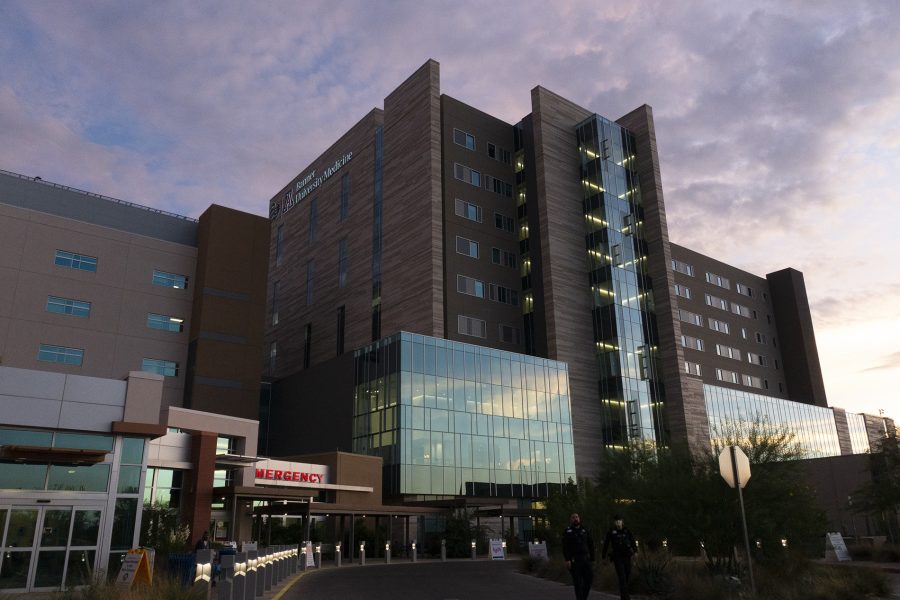A new forensic exam site for sexual assault survivors has opened at Banner University Medical Center on Aug. 25, thanks to a $499,382 grant from the U.S. Department of Justice and a collaboration between experts from the University of Arizona, the Southern Arizona Center Against Sexual Assault and Banner.
The grant aims to expand services for sexual assault survivors, including the creation of a Sexual Assault Response Team, a streamlined care service for students on campus.
Medical forensic exams are used to ensure the medical safety and wellness of a sexual assault patient and to collect forensic evidence that can be turned over to law enforcement should a survivor choose to do so. Previously, patients at Banner that chose to have an exam done would have to be transferred to Tucson Medical Center.
Dr. Melissa E. Zukowski, a co-medical director for the Sexual Assault Forensic Evaluation and Treatment program at Banner, said this process would pose additional trauma for the survivor, as they would have to tell their story multiple times and move between facilities. Now, patients can get the forensic and trauma care they need all in one place, according to Dr. Nathaniel Johnson, a co-medical director for the SAFE-T program.
RELATED: Arizona educators seek injunction on the ban of mask mandates
Forensic nurse examiners and advocates for a sexual assault patient are dispatched through the Southern Arizona Center Against Sexual Assault. Historically, SACASA only responded to Tucson Medical Center, as it was the only hospital where medical forensic exams were available.
Katlyn Monje, director of SACASA, said she recognized that this presented a challenge for individuals, especially UA students, who may have preferred to go to a closer hospital or not to transfer in the process of their medical care. The grant has not only allowed the launch of a new forensic exam site, but provided funding for additional medical forensic examiners and advocates so that survivors are better able to get access to services without delay.
“We know that nationally speaking, between the ages of 18 and 34, people are at the highest risk for being victimized. With that, we know we have a population to serve here, and bringing the services closer to campus, where many students live and work and play, is vital to decreasing that barrier to them accessing care,” Monje said.
The UA was one of eight institutions to be awarded this grant by the U.S. Department of Justice’s Office for Victims of Crime, aimed to support “medical forensic care, advocacy and other victim services to sexual assault survivors on campuses of higher education.” The funding was received in January, but some of the progress on the exam center was delayed due to COVID-19, according to Elise Lopez, principal investigator of the grant and director of the UA Consortium on Gender Based Violence.
Additional services will also be provided to UA students in the form of a Sexual Assault Response Team, managed by the UA Consortium on Gender Based Violence. Lopez said that SART is in its beginning stages and plans to launch this fall. The team will be a collaboration of representatives from different organizations on and off campus to increase awareness of the resources on campus.
“Whether it’s Title IX reporting, whether it is ‘What does law enforcement do?’ It’s knowing about the forensic exam program, it’s knowing about confidential survivor advocacy on campus,” Lopez said. “So it’s all these people working together to make it easier for our student survivors to access the services that they want, when they want them and not have to get the run around and try to figure out on their own how to find the things they need if they’ve been assaulted.”
SART plans to hold two open houses in September for those interested in participating in the group, learning more about their work or grant. Lopez said that though they have buy-in from various offices on campus, the team is interested in any student voices to participate, especially those who identify as a sexual assault survivor.
Additional resources for sexual assault survivors and support for advocacy can be found at the UA’s Counseling and Psych Services website, the University of Arizona Police Department’s website and the UA Office of Institutional Equity website.
Follow the Daily Wildcat on Twitter









